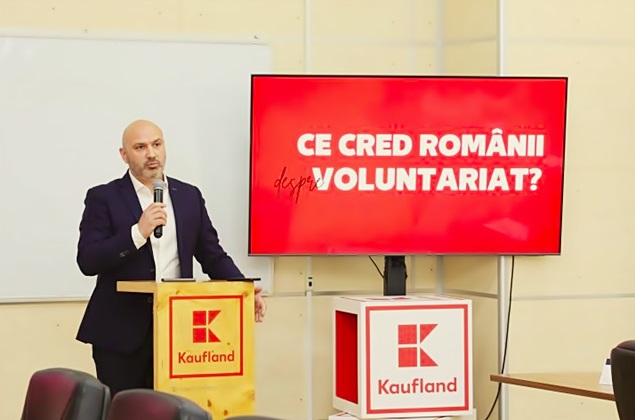1544

A study commissioned by Kaufland Romania, conducted between April and May 2024, in partnership with experts from the Faculty of Sociology and Social Work of the University of Bucharest, facilitated by UniBuc Consult - Training and Consultancy Service and the research company iSense Solutions on the attitude of Romanians towards volunteering, shows that only 5% of Romanians are constantly and actively involved in volunteer activities, although 92% consider volunteering a positive practice, whether they have worked as volunteers or not.
At the same time, Kaufland Romania announced the launch of the platform and program TimpPentruBine, which aims to develop volunteering activities both within the company and at the local and national levels.
According to the research results, one of the most extensive in recent years initiated by the private sector, the main reasons why Romanians volunteer are purely emotional, in an unorganized framework, however.
"Almost half (43%) of Romanians have not yet participated in volunteer activities in an official and organized framework, and emotion remains the main factor that motivates those who support volunteering. Associating volunteering with positive labels such as kindness (90%), responsibility (86%), or civic involvement (82%) gathers high degrees of agreement," the study states.
The results also reveal that the majority of respondents associate volunteering with positive aspects and mention a wide variety of reasons for choosing to spend their time this way.
More than half of the respondents do not volunteer due to lack of time or other obligations (55%), do not want to (52%), or believe that the state and other institutions should solve society's problems (51%).
Based on this data, Kaufland Romania, known for its responsible business model and community involvement, is launching a comprehensive communication campaign to promote the role of volunteering in developing a society and to increase the level of involvement of residents across the country.
The goal of the campaign and the study results confirm that there is great potential to increase civic engagement opportunities at the individual level in daily activities. Therefore, communication and awareness actions are needed to reach a culture of volunteering in Romania, beyond the emotional perception.
Regarding the institutionalized framework for volunteering, two-thirds (64%) of respondents do not know there is a volunteering law, and a similar number (74%) expressed their desire for a well-defined legislative framework for carrying out these activities.
This indicates the need for the concept to mature, transitioning from "good deeds" and civic sense to organized activities carried out according to legitimate norms and in line with strategic objectives that address the current needs of society.
"I believe in the power of volunteering to transform a society. Together we are capable of great things once we understand that you are truly fulfilled when you know you leave behind – a place, a person – better than you found them. This is the third year I dedicate a number of hours equal to my age to social causes – that is 48 hours by the end of 2024. And at Kaufland, each colleague has two extra days off for volunteer activities they choose themselves. I am proud to see them eager to help. And I am confident that through this campaign, there will be more of us, and we will help Romania become what we desire," said Marco Hößl, CEO of Kaufland Romania and Moldova.
Regarding sources of information about volunteering opportunities and mobilization for such causes, social networks (32%) and friends/acquaintances (24%) are the main ones. Moreover, the most credible sources of organizing volunteering for Romanians are citizen groups (29%), churches (27%), and NGOs (25%).
"The fact that the first place is occupied by citizen groups, without institutional/formal support, shows an image of civic involvement not so much as a result of a culture of volunteering, but rather a culture of good, built on spontaneity, causes that impress, and not on long-term projects, institutional support, and trust in institutions," the research results indicate.
"Volunteering, originating from military structures and later adopted by various social environments, has become a fundamental pillar in supporting social or ecological causes in society. Numerous studies demonstrate a positive correlation between involvement in volunteer activities and a longer and happier life for volunteers. In fact, happy people with a good social level are the ones who engage the most in volunteering, thus contributing to the community's well-being.
Therefore, volunteering not only improves the lives of those helped but also offers volunteers deep satisfaction and a superior quality of life," said Prof. Dr. Marian Preda, Rector of the University of Bucharest.
Moreover, the level of involvement in volunteer activities increases with the level of education.
Comparative analyses within the sample showed that volunteering is more widespread among people in urban areas, with higher age, income, and education levels. However, the positive attitude towards volunteering is widespread across all socio-demographic categories.





